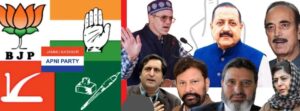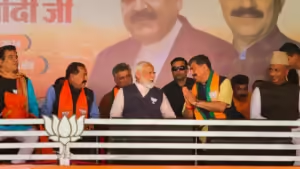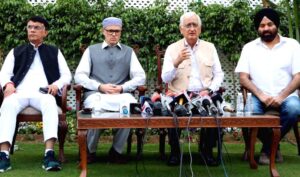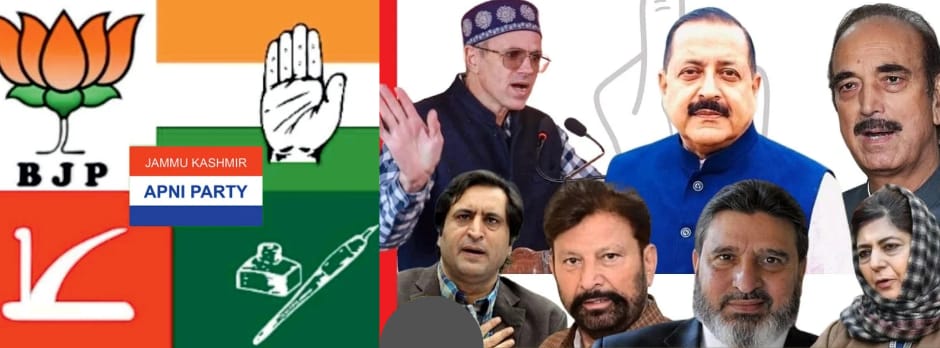Amid the Lok Sabha Elections of 2024, as the dust settles post-370, J&K emerges as the epicenter of a fierce political contest. The alliances, power plays, and aspirations that shape the region’s future are depicted in this gripping tale of democracy.
By Ajaz Rashid
As the political landscape of Jammu and Kashmir (JK) undergoes significant transformations post abrogation of Article 370, all eyes are on the upcoming Lok Sabha elections in 2024, and political parties are actively strategizing to capitalize on the evolving dynamics and sentiments of the region. This pivotal moment marks the first election in JK since its transition to a Union Territory- a move that was later upheld on December 11, 2023 by a five-judge bench of the Supreme Court.
The Lok Sabha elections in Jammu and Kashmir are scheduled to be conducted in five phases, with the counting of votes set for June 4. The results of these elections in the Union territory will also be declared on the same day. Udhampur has already kicked off the polling process in Phase 1 on April 19, and will be followed by the Jammu Lok Sabha constituency on April 26 (Phase 2), Anantnag-Rajouri on May 7 (Phase 3), Srinagar on May 13 (Phase 4), with Baramulla concluding the series in Phase 5 on May 20.
With the revocation of Article 370 in 2019, JK’s political scenario witnessed a paradigm shift. The erstwhile state was bifurcated into two Union Territories – Jammu and Kashmir, and Ladakh. This restructuring has redrawn the political map and injected new aspirations and challenges for political parties vying for power.
National parties like the Bharatiya Janata Party (BJP) and the Indian National Congress (INC) are recalibrating their strategies to resonate with the altered political landscape. For the BJP, the abrogation of Article 370 was a significant ideological and political triumph. They are expected to leverage this narrative to consolidate their presence in the region further. Meanwhile, the INC is attempting to reassert its relevance in the changed scenario by emphasizing issues of governance and development.
Likewise, regional parties like the Jammu and Kashmir National Conference (JKNC), Peoples Democratic Party (PDP), J&K Apni Party, J&K People’s Conference (JKPC), Democratic Azad Progressive Party (DPAP) and other parties are facing a crucial test of their political relevance and credibility post the Article 370 abrogation.

In a notable development, Punjab resident Baldev Singh’s decision to contest from Jammu and Kashmir’s Anantnag constituency adds an intriguing dimension to the electoral landscape. Singh’s candidacy marks a significant departure from the norm, reflecting the region’s evolving political openness since the abrogation of Article 370. His commitment to engage with the political process in Kashmir signals a broader involvement in the region’s electoral affairs.
The alliance between the National Conference and Congress emerges as a strategic move to consolidate opposition forces. Announced during a joint press conference by Omar Abdullah and Salman Khurshid, this alliance signifies a collective effort to present a viable challenge to the ruling party. The seat-sharing agreement between the two parties underscores their readiness to collaborate and contest the elections jointly, underscoring a larger collective goal.
However, the political landscape witnesses unexpected shifts as Ghulam Nabi Azad decides not to contest in the 2024 Lok Sabha elections. Azad’s withdrawal introduces a new dynamic in the electoral contest, particularly in the Anantnag-Rajouri constituency.
 PM Modi joins BJP leaders in a pre-election rally in Udhampur district, April 12, 2024. | PTI
PM Modi joins BJP leaders in a pre-election rally in Udhampur district, April 12, 2024. | PTI
Political Mileages and Challenges:
The upcoming Lok Sabha Elections in 2024 in Jammu and Kashmir are poised to witness a compelling narrative between the Bharatiya Janata Party (BJP) and the Congress, particularly in the Jammu Lok Sabha seat, which has seen a significant shift in recent electoral history.
The BJP is likely to leverage the narrative of national integration and development, citing the abrogation of Article 370 as a bold step towards mainstreaming JK with the rest of India. They aim to portray themselves as the architects of a new era of progress and stability in the region.
During a recent rally in Udhampur, Prime Minister Narendra Modi reiterated the BJP’s commitment to the region, promising, “Jammu and Kashmir will soon see assembly polls and statehood will be restored.” He emphasized the party’s narrative of national integration and development, stating, “The time is not far when assembly elections will be held in Jammu and Kashmir also. Jammu and Kashmir will get back its state status.”
Narendra Modi cited the abrogation of Article 370 as a bold step towards mainstreaming JK with the rest of India, affirming, “Whatever I have done so far is only serves as a trailer of the work that I am yet to do in the region.” He portrayed the BJP as the architects of a new era of progress and stability in the region, saying, “Vikas bhi ho raha hai, vishvaas bhi badh raha hai” (there is progress and confidence).
PM Modi highlighted the transformation over the past decade, stating, “In the last decade, Jammu and Kashmir have completely changed as roads, electricity, water, travel, and migration, all are available.”
Furthermore, he emphasized the reduction in terrorism, noting, “Now after decades, elections were taking place in Jammu and Kashmir without fear of terrorism and cross border firing.”
Prime Minister Modi pulls no punches in his condemnation of dynastic politics during the rally, advocating the cause of inclusive governance. ‘’In Jammu and Kashmir, political parties mean ‘of the family, by the family, for the family,” he underscores the need for change.
The Jammu Lok Sabha seat has undergone a significant transformation in recent electoral history. Once considered a traditional stronghold of the Congress party, it fell to the Bharatiya Janata Party (BJP) during the 2014 polls amidst the saffron wave that swept across the nation. Prior to 2014, the Congress had clinched victory in this constituency eight times since the 1967 general elections.
In the 2019 elections, Jugal Kishore of the BJP retained the seat by a substantial margin, defeating Congress’ Raman Bhalla by an impressive 3,02,875 votes. With a remarkable 72.4 percent voter turnout, Kishore secured 8,58,066 votes, while Bhalla trailed with 5,55,191 votes.
Likewise, Dr. Jitendra Singh, seeking a third consecutive term, has filed his nomination from the Udhampur constituency. His candidacy underscores his formidable presence in the region’s political landscape.
Having emerged victorious in the 2019 Lok Sabha elections with an impressive margin of 3,57,252 votes, Dr. Singh’s popularity and influence in Udhampur are evidently strong. This triumph followed his earlier success in the 2014 polls, where he secured victory by a margin of 60,976 votes, defeating former Congress leader Ghulam Nabi Azad.
During the first phase of voting in the parliamentary constituency, Udhampur, the voter turnout stood at 65.08% as of 5 pm. This marks a significant moment as Jammu and Kashmir cast their votes for the first time following the repeal of Article 370. In comparison, the voter turnout in Udhampur was 70.15% during the 2019 Lok Sabha Elections and 70.95% during the 2014 Lok Sabha Elections.
For Ladakh seat, the Bharatiya Janata Party (BJP) led by Jamyang Tsering Namgyal is likely to contest the elections.
Indian National Congress
The INC seeks to highlight issues of governance, economic development, and restoration of democratic rights in JK. They are striving to position themselves as the voice of moderation and inclusivity, contrasting with the BJP’s assertive nationalist agenda.
The Congress party’s recent nominations for the Lok Sabha seats in Jammu and Kashmir signify a strategic effort to strengthen its presence in the region and present a viable challenge to its political adversaries.
The inclusion of former BJP minister Lal Singh into the Congress fold and his subsequent nomination as the party’s candidate for the Udhampur Lok Sabha seat has sparked significant interest. Lal Singh’s established support base in the region, coupled with his vocal opposition to the BJP’s policies, particularly in the aftermath of the Article 370 abrogation, is expected to inject dynamism into the Congress’ campaign in Udhampur. Despite facing legal hurdles, his decision to contest as a Congress candidate underscores both his determination and the party’s confidence in him.
For the Jammu Lok Sabha seat, the Congress has chosen J&K Congress working president Raman Bhalla as its candidate. Bhalla, a seasoned politician, aims to reclaim the seat from the BJP incumbent, reflecting the party’s resolve to mount a formidable challenge.
In Ladakh, the Congress is poised to nominate Nawang Rigzin Jora, a former MLA, as its candidate for the parliamentary seat. This selection underscores the party’s commitment to contesting on all fronts in the region and presenting a credible alternative to its opponents.
By securing the support of the National Conference (NC) in the Ladakh seat, the Congress aims to bolster opposition unity against the ruling BJP. Despite the setback of not securing the Anantnag seat, the party’s sacrifice emphasizes its commitment to a broader opposition alliance, underscoring a larger collective goal.
With these strategic nominations, the Congress seeks to consolidate its position in Jammu and Kashmir and Ladakh by tapping into prevailing political sentiments and dynamics. The inclusion of Lal Singh and other key candidates highlights the party’s efforts to reshape the electoral landscape and provide a credible alternative to the ruling party. As the election campaign unfolds, the Congress aims to leverage these nominations to rally support and make significant gains in the region.
Regional Parties:
The JKNC and PDP are banking on the sentiments of regional identity and autonomy. They aim to mobilize support by appealing to the aspirations of the local population for self-determination and restoration of statehood, which they argue was compromised by the abrogation of Article 370.
On April 8, JKNC Vice President Omar Abdullah and Congress leader Salman Khurshid held a joint press conference, announcing the culmination of seat-sharing discussions between the Congress and the National Conference (NC) for the upcoming Lok Sabha polls in Jammu and Kashmir, as well as Ladakh. Both parties have agreed to contest three seats each in the alliance.

Congress and National Conference leaders announce seat-sharing agreement for Lok Sabha polls in Jammu and Kashmir and Ladakh during a press conference in New Delhi, April 8, 2024. | IANS
During the press conference, Omar Abdullah declared that Congress candidates would contest from the Udhampur, Jammu, and Ladakh Lok Sabha seats, while the National Conference would field candidates in Anantnag, Srinagar, and Baramulla.
“Congress candidates will contest from Udhampur, Jammu and Ladakh Lok Sabha seats and National Conference candidates will contest from Anantnag, Baramulla and Srinagar Lok Sabha seats, ” he said.
This announcement follows a breakdown in seat-sharing talks with the PDP, as indicated by Mehbooba Mufti’s naming of her party’s candidates for three seats in the Kashmir Valley.
Salman Khurshid addressed queries about the PDP, stating that while the party remains part of the INDIA bloc alliance, seat adjustment with them couldn’t be worked out due to the limited scope for such arrangements in the relatively small region of Jammu and Kashmir.
“Seat adjustment is just one aspect of our alliance. The PDP remains an integral part of the INDIA bloc. However, the broader INDIA alliance encompasses various other considerations. Given the limited geographical area of Jammu and Kashmir, despite our earnest attempts, there wasn’t much flexibility for seat adjustment,” remarked Khurshid.
Omar Abdullah emphasized that the alliance between the National Conference and Congress aims to fulfill the aspirations of the people of Jammu and Kashmir and Ladakh, with both parties committed to jointly contesting the elections and supporting each other’s candidates in the designated constituencies.
“The INDIA bloc will participate in the elections with the aim of addressing the aspirations of the people of Jammu and Kashmir, as well as Ladakh, and ensuring their genuine representation in Parliament”, Omar said.
Regarding the possibility of a Congress-NC alliance for the assembly polls, Abdullah indicated that their focus currently lies on the Lok Sabha elections, though the holding of assembly polls has been virtually decided according to statements by the Chief Election Commissioner and Union Home Minister Amit Shah.
Abdullah also addressed the controversy surrounding Ghulam Nabi Azad, stating that Azad’s candidacy in Anantnag appears to be against the interests of the BJP, suggesting a complex political scenario in the region.
Overall, Abdullah expressed confidence in the INDIA bloc’s prospects in Jammu and Kashmir and Ladakh, asserting that the opposition alliance is poised to win all six seats. He dismissed Prime Minister Modi’s ambitious claims about the BJP’s electoral success, characterizing them as indicative of a sense of unease within the ruling party.
On April 12, the National Conference formally announced its candidates for the upcoming Lok Sabha elections, with former chief minister Omar Abdullah set to contest from the Baramulla Lok Sabha seat and Aga Ruhullah Mehdi from the Srinagar constituency. Omar Abdullah, a seasoned politician, has a rich political history, having joined politics in 1998 as a Lok Sabha member from Srinagar. He was subsequently re-elected to Lok Sabha in 1999 and 2004 and has also served as a minister in the Atal Bihari Vajaypee government.
Omar Abdullah’s candidacy in the Baramulla Lok Sabha seat sets the stage for a direct contest with Peoples Conference president Sajad Gani Lone. Meanwhile, Aga Ruhullah Mehdi, an influential Shia leader from Budgam, will contest from the Srinagar Lok Sabha segment.
Omar Abdullah’s political journey has seen its ups and downs, including his defeat in the 2002 state polls to PDP’s Qazi Afzal from Ganderbal. However, he bounced back in the 2008 polls, winning from the Ganderbal segment. In the 2014 Assembly polls, he faced challenges but managed to secure victory, albeit by a narrow margin, against Nazir Ahmad Khan from the Beerwah seat.
Aga Ruhullah Mehdi, on the other hand, brings his experience as a three-time legislator to the electoral arena, representing the interests of the Shia community in Budgam.
The announcement of these candidates underscores the National Conference’s strategy and lineup for the upcoming elections, signaling their readiness to engage in the democratic process and vie for representation in the Lok Sabha.”
Omar Abdullah, in a statement to reporters, challenged the BJP’s claims in the Kashmir Valley, suggesting that if they fielded candidates there, they would lose their deposits. He emphasized his commitment by stating that if BJP candidates didn’t lose their deposits, he would quit politics.
Omar told reporters that if the BJP was confident of its claims on “development and normalcy”, then it should field its candidates in the three seats in the Kashmir Valley. He made these remarks in response to a meeting between BJP general secretary Tarun Chugh and Apni Party chief Altaf Bukhari, criticizing it as support for proxies now openly aligned with the BJP, which he viewed as contrary to New Delhi’s efforts.
Amidst the evolving political landscape, Shiv Sena’s Jammu and Kashmir unit has made a significant move by extending support to the National Conference (NC) for the upcoming Lok Sabha polls. According to a press release issued by the party’s state chief, a delegation led by the party’s Kashmir division president met with NC president Dr. Farooq Abdullah to convey their support. The support comes with conditions, focusing on key issues such as the restoration of statehood to Jammu and Kashmir, protection of its cultural identity, and equitable development across the region. This development adds an interesting dimension to the alliances shaping up for the elections.
People’s Democratic Party
The People’s Democratic Party (PDP) has nominated Mehbooba Mufti as its candidate for the Anantnag-Rajouri Parliamentary seat, while Waheed Ur Rehman Para will contest from Srinagar, and Fayaz Ahmad Mir from Baramulla.
The decision to field PDP leaders in the Kashmir Valley’s electoral arena underscores the failure of both the national-level INDIA bloc and the J&K-level People’s Alliance for Gupkar Declaration (PAGD) to form a pre-poll alliance, primarily due to disagreements over seat allocation.
On April 7th, the PDP announced its intention to contest all three Lok Sabha seats in the Kashmir Valley, with Mehbooba Mufti vying for the south Kashmir’s Anantnag-Rajouri seat. Waheed-ur-Rehman Parra, the PDP’s youth president, will run for the central Kashmir’s Srinagar seat, while former Rajya Sabha member Fayaz Ahmad Mir will contest from north Kashmir’s Baramulla seat.
In response to the situation, Mehbooba Mufti emphasized the importance of democratic resistance, urging people to fearlessly express their grievances and stand united against oppression. She reaffirmed her commitment to representing the aspirations of her people, despite facing personal and political targeting.
In a pointed critique, Waheed Para directs his ire at the National Conference, alleging their role in the breakdown of the JKPAGD alliance and their nomination of a candidate for the Anantnag-Rajouri seat. Speaking to the media on the sidelines of a workers’ meeting in South Kashmir’s Shopian district on April 12, Para emphasizes Mehbooba Mufti’s dedicated efforts and sacrifices to uphold the PAGD alliance, contrasting it with the NC’s decision to unilaterally dissolve it.
While the failure to form a pre-poll alliance with other parties persists, Mehbooba Mufti mentioned that the PDP has decided to extend unconditional support to the Congress on two seats in Jammu.
Amidst these developments, Sajad Gani Lone, the leader of the People’s Conference (PC), articulated his vision for the region’s future. During a party meeting on the sidelines of a function on April 3rd, Sajad Gani Lone engaged with reporters, stating, “I strongly believe that even today the biggest CBM towards Kashmiris would be the registration of an FIR against Farooq Abdullah, Congress leaders and bureaucrats who rigged the 1987 election.” He emphasized the significance of addressing this historical issue, asserting, “After all, one lakh people have died. Were they not humans? Don’t those lives matter?”
Lone criticized the NC MPs, alleging, “They have been in the Parliament for the past 28 years. Have they ever talked about the aspirations and dreams of the Kashmiris?” He accused the NC of using parliamentary positions to “get a leeway for their crimes.”
Furthermore, he accused Omar Abdullah of whitewashing atrocities against Kashmiris during his tenure as foreign minister, stating, “Omar Abdullah whitewashed atrocities against Kashmiris during his stint as foreign minister.”
Sajad Gani Lone’s remarks came as he announced his candidacy for the Baramulla Lok Sabha constituency in the upcoming elections.
BJP’s Support to Sajad Lone and Altaf Bukhari
In a significant development, Sajad Lone and Altaf Bukhari are edging closer to forming an alliance, spurred by the BJP’s pledge to back “patriotic” parties in the Valley. Lone, seeking support from the Apni Party in his seat Baramulla, has promised reciprocal assistance in other constituencies.
The impending alliance between the People’s Conference and the Apni Party comes amidst accusations from rivals regarding their alleged ties with the Centre and the BJP. Despite these allegations, both parties are moving forward with their collaboration, buoyed by the BJP’s assurance of support to “patriotic” parties in the Valley.
During a press conference 20th April, Lone underscored the National Conference’s (NC) ability to win seats despite a decrease in their vote share, citing vote fragmentation. He noted that out of the 10 MPs from north Kashmir, 9 are from the NC, emphasizing the necessity of consolidating anti-NC votes.
Lone urged Altaf Bukhari, the president of the Apni Party, to support the People’s Conference in north Kashmir, pledging reciprocal assistance, especially in Srinagar. He stressed the importance of uniting against the NC for effective parliamentary representation.
“I urge him to consider supporting us in north Kashmir by not fielding their candidate, while we commit to offering unconditional support elsewhere, especially in Srinagar”, Lone said.
While remaining open to collaboration with other parties, Lone highlighted the Apni Party’s influence in north Kashmir’s electoral outcomes and downplayed the BJP’s impact in the region based on past election results.
In response to Omar Abdullah’s criticism, Lone defended his position, asserting that their focus is on representing the people’s interests rather than engaging in personal attacks. He called upon Abdullah to address substantive issues.
Jammu & Kashmir Apni Party, led by Syed Altaf Bukhari, unveiled its candidates for 2 Lok Sabha seats in the Valley on April 5 . Mohammad Ashraf Mir will contest from the Srinagar constituency, while Zafar Iqbal Manhas will represent the party in the Anantnag-Rajouri constituency. However, the party is yet to announce a candidate for the north Kashmir Baramulla constituency. This announcement adds an interesting dimension to the Lok Sabha election battle in these constituencies.
Ghulam Nabi Azad’s Exit:
Ghulam Nabi Azad, the president of the Democratic Progressive Azad Party (DPAP), has decided not to contest in the 2024 Lok Sabha elections despite being initially nominated for the Anantnag-Rajouri constituency. DPAP announced Azad’s withdrawal without specifying the reasons behind his decision. In response to Azad’s exit, DPAP swiftly selected Advocate Saleem Parray as the party’s new candidate for the Anantnag-Rajouri constituency.

Azad’s departure has introduced a significant change in the electoral landscape of Jammu and Kashmir, particularly in the Anantnag-Rajouri constituency. Advocate Saleem Parray’s nomination adds a new dimension to the electoral contest, as he will now compete against prominent rivals such as against prominent Mehbooba Mufti, the president of the People’s Democratic Party (PDP), and Mian Altaf, a senior leader from the National Conference. Parray’s candidacy adds a new dimension to an already high-stakes electoral contest in the region.
Ghulam Nabi Azad’s unexpected withdrawal has stirred interest and speculation, reshaping the dynamics of the Lok Sabha elections in Jammu and Kashmir. The emergence of Advocate Saleem Parray as DPAP’s new candidate sets the stage for an intriguing electoral battle in the Anantnag-Rajouri constituency.
Non-Local competes after Article 370
In a notable development since the abrogation of Article 370, Punjab resident Baldev Singh is set to contest from Jammu and Kashmir’s Anantnag constituency, marking a significant departure from the norm. Singh, aged 67, asserts a deep connection with the people of Kashmir, having engaged in philanthropic efforts during the 2014 floods.
What sets Singh apart is his status as the sole non-resident of Kashmir to file a nomination for an election in the region post the abrogation of Article 370 in 2019. Hailing from Nayagaon in Mohali, Punjab, Singh emphasizes his extensive engagement with Kashmir, having spent two decades moving across various districts in the region.
Singh’s decision to contest from Anantnag reflects his commitment to engage with the political process in Kashmir. Additionally, he announces his intention to file a nomination for the Srinagar parliamentary constituency, demonstrating a broader involvement in the electoral landscape of the region.
As the countdown to the Lok Sabha elections 2024 begins, the political dynamics in Jammu and Kashmir are at a crossroads. The aftermath of the Article 370 abrogation has redefined the contours of political discourse, presenting both challenges and opportunities for political parties. The upcoming elections will not only shape the future governance of the region but also reflect the aspirations and choices of its people in the post-Article 370 era.
Blurbs
- “The INDIA bloc will participate in the elections with the aim of addressing the aspirations of the people of Jammu and Kashmir, as well as Ladakh, and ensuring their genuine representation in Parliament.” – Omar Abdullah
- “While the failure to form a pre-poll alliance with other parties persists, Mehbooba Mufti mentioned that the PDP has decided to extend unconditional support to the Congress on two seats in Jammu.”

Leave a Reply